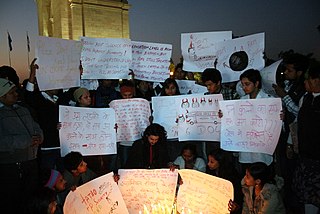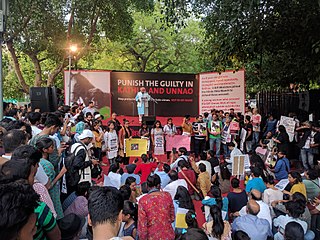Related Research Articles

Jeans are a type of pants or trousers made from denim or dungaree cloth. Often the term "jeans" refers to a particular style of trousers, called "blue jeans", with the addition of copper pocket rivets added by Jacob W. Davis in 1871 and patented by Davis and Levi Strauss on May 20, 1873. Prior to the patent, the term "blue jeans" had been long in use for various garments, constructed from blue-colored denim.

The judicial system of Egypt is an independent branch of the Egyptian government which includes both secular and religious courts.

Louise Nicholas is a New Zealand campaigner for the rights of women who have been victims of sexual violence. She has made rape allegations against at least nine men, including at least seven police officers. Although none of these allegations have been proven in court, they have resulted in several high-profile trials and an investigation into a possible police cover-up.
Statistics on rape and other acts of sexual assault are commonly available in industrialized countries, and have become better documented throughout the world. Inconsistent definitions of rape, different rates of reporting, recording, prosecution and conviction for rape can create controversial statistical disparities, and lead to accusations that many rape statistics are unreliable or misleading.
The timeline of women's legal rights (other than voting) represents formal changes and reforms regarding women's rights. The changes include actual law reforms, as well as other formal changes (e.g. reforms through new interpretations of laws by precedents). The right to vote is exempted from the timeline: for that right, see Timeline of women's suffrage. The timeline excludes ideological changes and events within feminism and antifeminism; for that, see Timeline of feminism.
The Mathura rape case was an incident of custodial rape in India on 26 March 1972, wherein Mathura, a young tribal girl, was allegedly raped by two policemen on the compound of Desaiganj Police Station in Gadchiroli district of Maharashtra. After the Supreme Court acquitted the accused, there was public outcry and protests, which eventually led to amendments in the Indian rape law via The Criminal Law Amendment Act 1983.

Trousers or pants are a staple of historical and modern fashion. Throughout history, the role of trousers is a constant change for women. The first appearance of trousers in recorded history is among nomadic steppe-people in Western Europe. Steppe people were a group of nomads of various different ethnic groups that lived in the Eurasian grasslands. Archaeological evidence suggests that men and women alike wore trousers in that cultural context. However, for much of modern history, the use of trousers has been restricted to men. This norm was enforced in many regions due to social customs and laws. There are, however, many historical cases of women wearing trousers in defiance of these norms such as the 1850s women rights movement, comfort, freedom of movement, fashion, disguise, attempts to evade the gender pay gap, and attempts to establish an empowered public identity for women. Especially in the 20th and 21st centuries, the customs and laws restricting this manner of dress have relaxed dramatically, reflecting a growing acceptance and normalisation of the practice.

Trousers, slacks, or pants are an item of clothing worn from the waist to anywhere between the knees and the ankles, covering both legs separately. In the UK or the United Kingdom, the word pants generally means underwear and not trousers. Shorts are similar to trousers, but with legs that come down only to around the area of the knee, higher or lower depending on the style of the garment. To distinguish them from shorts, trousers may be called "long trousers" in certain contexts such as school uniform, where tailored shorts may be called "short trousers" in the UK.
The anti-rape movement is a sociopolitical movement which is part of the movement seeking to combat violence against and the abuse of women.

The Victim Rights Law Center (VRLC) is a non-profit organization that provides free legal services to victims of rape and sexual assault in Massachusetts and Oregon. Established in 2003, it became the first nonprofit law center in the United States solely dedicated to serving the legal needs of sexual assault victims. The VRLC mission is to "provide legal representation to victims of rape and sexual assault to help rebuild their lives and to promote a national movement committed to seeking justice for every rape and sexual assault victim." VRLC also seeks to transform the legal response to sexual assault in the United States.

Criminalization of consensual BDSM practices is usually not with explicit reference to BDSM, but results from the fact that such behavior as spanking or cuffing someone could be considered a breach of personal rights, which in principle constitutes a criminal offense. In Germany, Netherlands, Japan and Scandinavia, such behavior is legal in principle. In Austria the legal status is not clear, while in Switzerland some BDSM practices can be considered criminal.
Sexual Assault Awareness Month (SAAM) is an annual campaign to raise public awareness about sexual assault and educate communities and individuals on how to prevent sexual violence in the United States. It is observed in April.

SlutWalk is a transnational movement calling for an end to rape culture, including victim blaming and slut-shaming of sexual assault victims. Participants protest against explaining or excusing rape by referring to any aspect of a woman's appearance. The rallies began on April 3, 2011, in Toronto, Ontario, Canada, after a Toronto Police officer suggested that "women should avoid dressing like sluts" as a precaution against sexual assault. Subsequent rallies have occurred globally.
Rape is the fourth most common crime against women in India. According to the 2021 annual report of the National Crime Records Bureau (NCRB), 31,677 rape cases were registered across the country, or an average of 86 cases daily, a rise from 2020 with 28,046 cases, while in 2019, 32,033 cases were registered. Of the total 31,677 rape cases, 28,147 of the rapes were committed by persons known to the victim. The share of victims who were minors or below 18 – the legal age of consent – stood at 10%.
Feminism in Italy originated during the Italian Renaissance period, beginning in the late 13th century. Italian writers such as Moderata Fonte, Lucrezia Marinella, and others developed the theoretical ideas behind gender equality. In contrast to feminist movements in France and United Kingdom, early women's rights advocates in Italy emphasized women's education and improvement in social conditions.

The 2012 Delhi gang rape and murder, commonly known as the Nirbhaya case, involved a rape and fatal assault that occurred on 16 December 2012 in Munirka, a neighbourhood in South Delhi. The incident took place when Jyoti Singh, a 22-year-old physiotherapy intern, was beaten, gang-raped, and tortured in a private bus in which she was travelling with her male friend, Avnindra Pratap Pandey. There were six others in the bus, including the driver, all of whom raped the woman and beat her friend. She was rushed to Safdarjung Hospital in Delhi for treatment and transferred to Singapore eleven days after the assault, where she succumbed to her injuries two days later. The incident generated widespread national and international coverage and was widely condemned, both in India and abroad. Subsequently, public protests against the state and central governments for failing to provide adequate security for women took place in New Delhi, where thousands of protesters clashed with security forces. Similar protests took place in major cities throughout the country. Since Indian law does not allow the press to publish a rape victim's name, the victim was widely known as Nirbhaya, meaning "fearless", and her struggle and death became a symbol of women's resistance to rape around the world.
After a sexual assault or rape, victims are often subjected to scrutiny and, in some cases, mistreatment. Victims undergo medical examinations and are interviewed by police. If there is a criminal trial, victims suffer a loss of privacy, and their credibility may be challenged. Victims may also become the target of slut-shaming, abuse, social stigmatization, sexual slurs and cyberbullying. These factors, contributing to a rape culture, are among some of the reasons that may contribute up to 80% of all rapes going unreported in the U.S, according to a 2016 study done by the U.S. Department of Justice.

The Unnao rape case refers to the gang rape of a 17-year-old girl on 4 June 2017 in Unnao, Uttar Pradesh, India. On 16 December 2019, former BJP MLA Kuldeep Singh Sengar was convicted for the rape on 20 December 2019 and sentenced to life imprisonment. Further, Sengar was found guilty in the death of the girl's father in judicial custody.
Patricia Occhiuzzo Giggans, also known as Patti Giggans, is a Los Angeles–based feminist activist and advocate for supporting victims of domestic violence.

The Pollachi sexual assault case refers to a case of rape and extortion of numerous women by a gang in Pollachi, Coimbatore in the Indian state of Tamil Nadu. The gang would entice women into isolated places after befriending them on social media and sexually assault them and filmed the act. The videos were later used to blackmail the women for sexual favors or money. The gang came into spotlight after the family of a 19-year-old college student who claimed to had been sexually assaulted and blackmailed complained to the police. According to media accounts, at least 200 women are sexually assaulted in the very same manner and the victims were college and school teachers, doctors, higher secondary school students from all over the state. On the mobiles of the accused, police said they discovered dozens of video recordings of women being abused at a farmhouse belonging to one of the accused and some were leaked.
References
- 1 2 "Denim Day's history of international solidary against sexual assault". www.army.mil.
- 1 2 3 "Why Denim?". Denim Day.
- 1 2 3 "Italian court reverses 'tight jeans' rape ruling". independent. Retrieved 2021-01-23.
- 1 2 3 4 5 6 Stanley, Alessandra (16 February 1999). "Ruling on Tight Jeans and Rape Sets Off Anger in Italy". The New York Times.
- ↑ "Denim Day 2020". CARE: Campus Advocacy Resources, and Education.
- ↑ Faedi, Benedetta (2009). "Rape, Blue Jeans, and Judicial Developments in Italy". Columbia Journal of European Law. Archived from the original on August 28, 2011. Retrieved April 26, 2011.
- ↑ Faedi Duramy, Benedetta (2009-01-01). "Rape, Blue Jeans, and Judicial Developments in Italy". Publications.
- ↑ Faedi, Benedetta. "Rape, Blue Jeans, and Judicial Developments in Italy" (PDF). Archived from the original (PDF) on 2016-02-20. Retrieved 2023-07-27.
- ↑ "La Repubblica/Fatti: La 'sentenza dei jeans' tra maschilismo e garantismo". The New York Times. 16 February 1999.
- ↑ "History of Denim Day". University of Wisconsin Oshkosh.edu. Retrieved 2020-05-26.
- ↑ "Denim Day Celebrates 20 Years of Advocacy for Sexual Violence Survivors". spectrumnews1.com. Retrieved 2020-05-26.
- ↑ Singh, Tejinder (2017-04-20). "Denim Day Observation for Promoting Awareness of Sexual Assault". The America Times. Retrieved 2023-07-27.